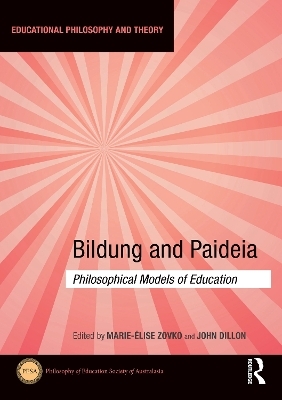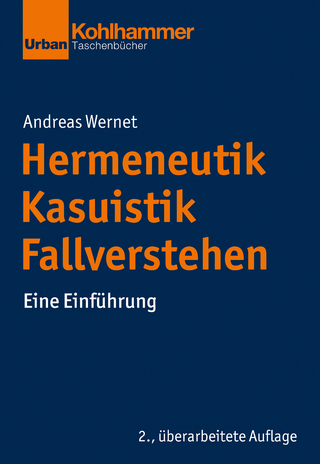
Bildung and Paideia
Routledge (Verlag)
978-0-367-69597-2 (ISBN)
The study of what it is to be human is traditionally the task of the humanities. In recent years, however, the humanities have been increasingly subordinated to technological, economic, and utilitarian aims. Do the humanities still have a fundamentally distinct task to fulfil in education? Today’s reduction of educational outcomes to measurable competencies and economically exploitable skills is opposed to traditional ideals like that of Greek paideia and the German Romantic concept of Bildung, which emphasized formation of the whole human being. The present volume takes as its point of departure the conviction that the study of ‘the human experience'—whether through philosophy, literature, religion, art, music, history, or languages—has something specific to offer in the realm of education today. The individual contributions examine the specific role of philosophy and the humanities in education from ancient times to the present and explore possibilities for conceiving philosophical models of education.
The chapters in this book were originally published as a special issue of the journal Educational Philosophy and Theory.
Marie-Élise Zovko is Senior Research Fellow at the Institute of Philosophy, Zagreb, Croatia, specializing in Platonism, Spinoza, Kant, and German Idealism and Romantic philosophy. John Dillon is Professor Emeritus, a classicist, philosopher, and internationally renowned expert on Platonism. Professor Dillon taught at the University of California, Berkeley, USA (1969–1980), and served as Regius Professor of Classics, Trinity College Dublin, Ireland (1980–2006).
Editorial: Deep learning, education and the final stage of automation
Michael A. Peters
Introduction: Humanism vs. competency: Traditional and contemporary models of education
Marie-Élise Zovko and John Dillon
1. Mania and knowledge. From the sting of the gods to Socrates as educational gadfly
Michael Erler (Transl. by Marie-Élise Zovko)
2. Purification through emotions: The role of shame in Plato’s Sophist 230b4–e5
Laura Candiotto
3. Worldly and otherworldly virtue: Likeness to God as educational ideal in Plato, Plotinus, and today
Marie-Élise Zovko
4. Paideia Platonikê: Does the later Platonist programme of education retain any validity today?
John Dillon
5. “Πᾶσα μὲν ἡ ποίησις τῷ Ὁμήρῳ ἀρετῆς ἐστιν ἔπαινος”: Greek poetry and paideia in the homiletic tradition of Basil
Sarah Klitenic Wear
6. Bild, Bildung and the ‘romance of the soul’: Reflections upon the image of Meister Eckhart
Douglas Hedley
7. Kabbalah, education, and prayer: Jewish learning in the seventeenth century
Gerold Necker
8. Philosophy of education in early Fichte
Tamás Hankovszky
9. Hölderlin’s idea of ‘Bildungstrieb’: A model from yesteryear?
Violetta L. Waibel (Transl. by Marie-Élise Zovko)
10. Hegel’s concept of education from the point of view of his idea of ‘second nature’
Jure Zovko (Transl. by Marie-Élise Zovko)
11. Bildung and the historical and genealogical critique of contemporary culture: Wilhelm von Humboldt’s neo-humanistic theory of Bildung and Nietzsche’s critique of neo-humanistic ideas in Classical philology and education
Tomislav Zelić
12. Friedrich Nietzsche in Basel: An apology for classical studies
Carlotta Santini
13. Werner Jaeger’s Paideia and his ‘Third Humanism’
Christoph Horn (Transl. by Marie-Élise Zovko)
14. Radicalising philosophy of education—The case of Jean-Francois Lyotard
Jones Irwin
15. The existential concern of the humanities: R.S. Peters’ justification of liberal education
Stefaan E. Cuypers
16. Paideia, progress, puzzlement
Herbert Hrachovec
17. Rebirth of paideia: ultimacy and the game of games
Jonathan Doner
18. Education is mutual: In search of the ideal interpretation
Vladimir Stoupel and Judith Ingolfsson
| Erscheinungsdatum | 28.09.2023 |
|---|---|
| Reihe/Serie | Educational Philosophy and Theory |
| Verlagsort | London |
| Sprache | englisch |
| Maße | 174 x 246 mm |
| Gewicht | 460 g |
| Themenwelt | Geisteswissenschaften ► Philosophie |
| Sozialwissenschaften ► Pädagogik ► Allgemeines / Lexika | |
| Sozialwissenschaften ► Pädagogik ► Bildungstheorie | |
| ISBN-10 | 0-367-69597-9 / 0367695979 |
| ISBN-13 | 978-0-367-69597-2 / 9780367695972 |
| Zustand | Neuware |
| Informationen gemäß Produktsicherheitsverordnung (GPSR) | |
| Haben Sie eine Frage zum Produkt? |
aus dem Bereich


